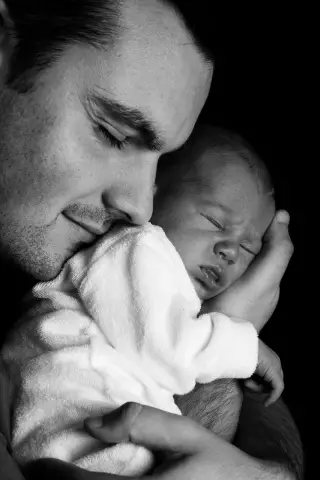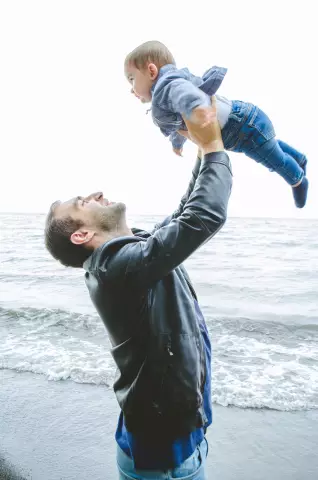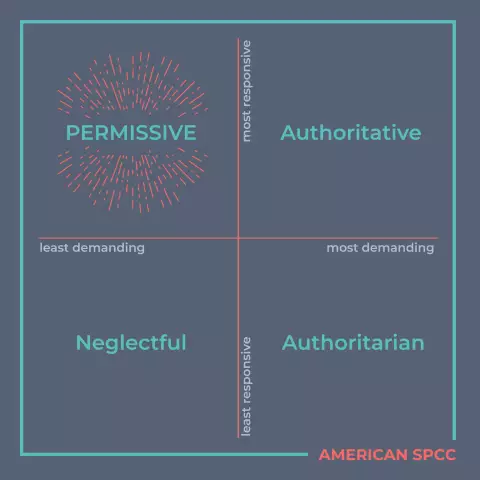- Author Rachel Wainwright wainwright@abchealthonline.com.
- Public 2023-12-15 07:39.
- Last modified 2025-11-02 20:14.
Parenting systems

Systems of upbringing children - a set of principles underlying the educational process and determining the methods, goals and objectives, content and organization of the educational process. Each educational system focuses on certain aspects of the educational process: physical, aesthetic, mental development. It is extremely difficult for modern parents to make an informed choice. How to choose the only correct parenting system? Should you follow certain systems? What are the main types of parenting?
Parenting systems: is it worth following the recommendations?
The birth of a child is an important stage in the life of every family. Raising children is one of the main tasks of parents. At an early age, the basic character traits are laid, the child develops a certain model of behavior, which in the future will only improve under the influence of various life factors and society. Mistakes made in the educational process can negatively affect not only the child's obedience in childhood, his school performance, communication with peers, but also the adult life of a person, his hard work and ability to work, the efficiency and productivity of family life, and position in society. Conscious upbringing is a balanced approach of all family members to the educational process in order to form a harmonious personality, intellectually developed, moral member of society. The educational process is the preparation of a child for life in modern society. Today, there are many systems for raising children, each of which is based on a specific approach to the development of certain personality traits, which, according to the creators of the system, are the most important from the point of view of personal development.
Having chosen a conscious upbringing for themselves, parents ask themselves which system of upbringing their children to choose? There is no definite answer to this question, since each child is individual and requires an individual approach to the process of his upbringing. So, the behavior of a child at an early age is due to his physiological and mental needs and characteristics. He is not yet aware of the essence and role of manipulating adults, so his whims are unintentional.
Any of the available parenting systems is only advisory in nature. You cannot blindly follow any one method. Choosing the best of each effective method is the best solution for each family.
The German child-rearing system presupposes clarity and organization in every aspect of a child's life: daily routine, nutrition, learning and development, hobbies and communication with adults and peers. This education system pays special attention to the personal space of the child. Traditionally, the child has his own territory, where he is free to do what he wants, but the rest of the house must be in order. Motherhood does not exclude German women from public life and careers. In modern Germany, children's educational institutions adhere to a child-rearing system based on the traditions and culture of the country, excluding authoritarianism and personal suppression.
The French parenting system is more loyal to the children in the family. However, parents prefer a career to raising a child, while French kindergartens are ready to accept babies under six months old. Family and solidarity go a long way.
The Japanese child-rearing system presupposes permissiveness in the behavior of a child until he reaches 5 years old, strictness and limitedness in his upbringing from 5 to 15 years. Upon reaching the age of 15, the child is treated as an equal.
Another universally recognized and practiced all over the world is the system of raising children of Maria Montessori. The fundamental principle of the system is to help and assist the child in independent cognition and mastery of the world. This is how the child learns to independently learn the nature of things, which is an indispensable skill in adult life.
Among the variety of available child-rearing systems, there is no single correct one that will help to accurately and successfully raise a child.
Types of parenting and their main characteristics
Psychologists identify 5 main types of parenting. The type of upbringing is the model that parents adhere to in their attitude to the upbringing process. So, the main types of child rearing are:
- The authoritarian type is an upbringing process characterized by strict discipline, lack of parental love and affection, leveling of the child's interests, limiting the child's independence, and strict control over everything that happens in the family. The educational process is governed by clear rules that must be followed. This type of upbringing gives rise to conflicts and mutual misunderstanding between parents and children in adolescence, or it provokes the formation of a weak personality, easily amenable to "bad" influence;
- Liberal type - the upbringing process is characterized by a soft approach, permissiveness, minimal discipline, the absence of prohibitions and restrictions, clear requirements and boundaries of what is permissible. Children in the process of such upbringing often grow up to be conflicted personalities, rejecting in communication and relationships those who do not indulge their interests. Liberal upbringing leads to poor school performance due to the child's lack of understanding of the requirements, strictly follow discipline;
- The authoritative type of parenting is a parenting process based on discipline and rational problem-oriented strategies in relationships. This type of upbringing provides for a certain independence of the child, an alternative to behavior, which develops a sense of self-confidence, duty and responsibility;
- A chaotic type of upbringing is an upbringing process characterized by the lack of a clear strategy on the part of the parents in the formation of the child's personality, requirements, discipline, unpredictability of decisions and actions on the part of the parents, as a result, the child develops insecure, irresponsible, indecisive;
- The guardian type - overprotection as an educational process manifests itself in the desire to do everything for the child, to solve all the tasks assigned to him, as a result of which the child develops an overestimated self-esteem, a feeling of anxiety, helplessness, and selfishness.
The procedure for raising children

Choosing the right tactics and methods of raising children, parents should not forget about the basic principles and procedures for the implementation of the educational process, regardless of the chosen system of raising children. Any procedure for raising children must comply with the following principles:
- Obligation;
- Complexity;
- Equivalence.
The order of raising children in each family is regulated by the accepted norms, regime, foundations, while creating comfortable conditions for ensuring the harmonious development of the child.
Found a mistake in the text? Select it and press Ctrl + Enter.





